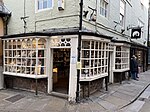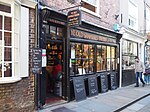York's Chocolate Story
2012 establishments in EnglandChocolate museumsEconomy of North YorkshireFood museums in the United KingdomMuseums established in 2012 ... and 3 more
Museums in YorkUnited Kingdom museum stubsUse British English from October 2020

York's Chocolate Story is a visitor attraction and chocolate museum on King's Square, in York. Opened in March 2012, it shows the history of chocolate making in York, including the Rowntree's factory which opened in 1890, owned since 1988 by Nestlé.The attraction is located in the centre of York, in King's Square. In 2018 it won gold in the Guided Tour of the Year category of the VisitEngland Awards.
Excerpt from the Wikipedia article York's Chocolate Story (License: CC BY-SA 3.0, Authors, Images).York's Chocolate Story
York Bishophill
Geographical coordinates (GPS) Address Website External links Nearby Places Show on map
Geographical coordinates (GPS)
| Latitude | Longitude |
|---|---|
| N 53.96 ° | E -1.0804166666667 ° |
Address
York's Chocolate Story
YO1 7LD York, Bishophill
England, United Kingdom
Open on Google Maps






